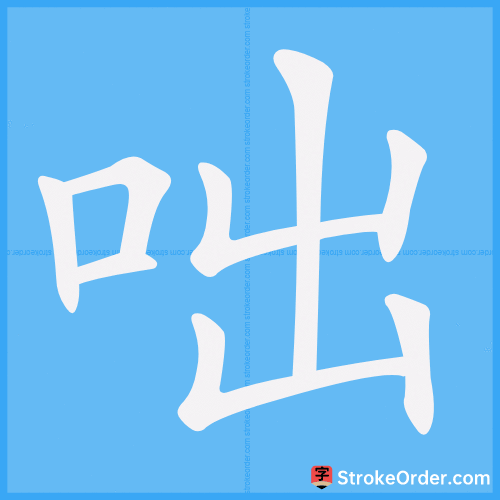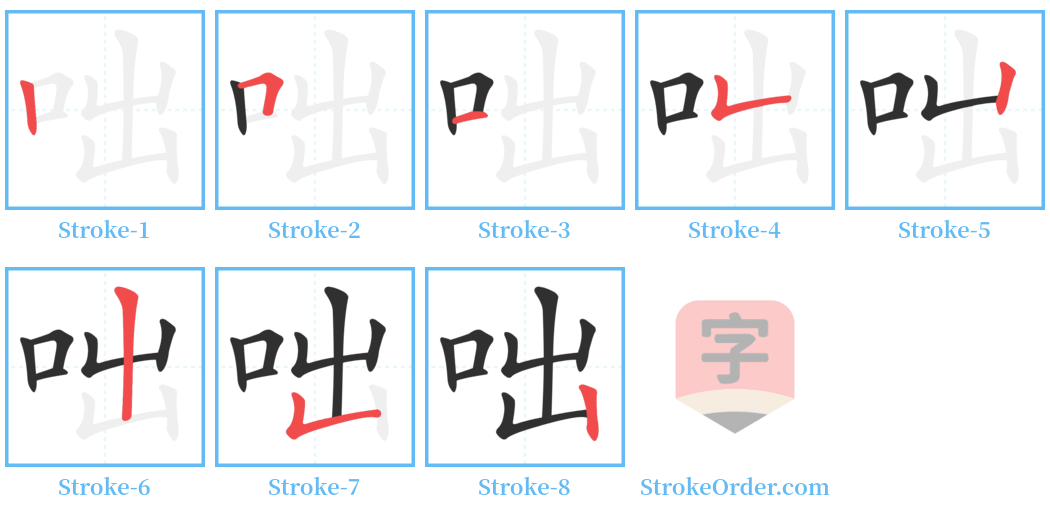咄 Stroke Order
Animated Stroke Order of 咄

Stroke Order Diagrams for 咄

Step-by-Step Handwriting Guide for 咄

Learn to Write Chinese Characters with Video Tutorials
Watch the video of writing the Chinese character "咄", learn the correct stroke order (笔顺) of the character "咄", and master the standard way of writing the character "咄".
Free Printable Handwriting Practice with Stroke Order: 咄
Printable Writing Practice Worksheet of "咄" in Portrait Orientation (Tian Zi Ge)

Printable Writing Practice Worksheet of "咄" in Landscape Orientation (Tian Zi Ge)

Information of 咄
Pinyin
duō
Radical
口
Strokes
8 strokes
Usage
★★★★★
Definition
noise of rage, cry out in anger
咄 [duō]
1. [Exclamation] Indicates surprise or astonishment, as in "咄怪事" (What a strange thing!).
2. [Verb] To scold or reprimand.
本义: 呵叱声 (Sound of scolding).
造字法: 形声 (Phono-semantic compound). From mouth, making a sound.
引:
1. 《说文》: 咄,相调也。 (Duō, to call in response.)
2. 《字林》: 咄,相诃也。 (Duō, to criticize.)
3. 《苍颉篇》: 咄,啐也。 (Duō, to spit.)
4. 《汉书·东方朔传》: 咄!口无毛。 注: "叱咄之声。" (Duō! No hair on your mouth. Note: "The sound of scolding.")
5. 《史记》: 郭舍人疾言骂之曰:“咄!老女子!何不疾行!”(The servant Guo angrily scolded: "Duō! Old woman! Why don't you hurry!")
6. 《水浒传》: 咄!你是个破落户。 (Duō! You are a destitute person.)
例:
咄叱 (to scold); 咄啐 (to reprimand); 咄骂 (to scold and insult).
动:
1. To reprimand or scold.
《管子·形势解》: "乌集之交,初虽相驩,后必相咄。" (In the meeting of crows, although they initially enjoy each other, they will eventually scold each other.)
《聊斋志异·卷二·聂小倩》: "女云:『夜无知者。』宁又咄之。" (The woman said: "Those who are unaware at night." I'd rather scold them again.)
叹:
1. Indicates scolding.
《史记·卷一二六·滑稽传》: "郭舍人疾言骂之曰:『咄!老女子!何不疾行!』" (The servant Guo angrily scolded: "Duō! Old woman! Why don't you hurry?")
2. Indicates sorrow.
《汉书·卷五四·李广传》: "立政曰:『咄!少卿良苦!』" (Li Zheng said: "Duō! Young minister, you have worked hard!")
Input Method for 咄
Pinyin
duo1
Wubi
kbmh
Cangjie
ruu
Zhengma
jzzi
Four Corner
62072
Unicode
U+5484
Same Pronunciation Characters